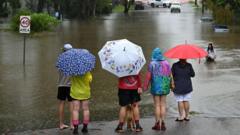Hundreds of thousands of homes in eastern Australia remain without electricity as Cyclone Alfred wreaks havoc on the east coast, particularly affecting residents in southeast Queensland and northern New South Wales (NSW). The aftermath of the storm has left communities devastated, with extensive flooding damaging properties and infrastructure.
Authorities reported a tragic death connected to the storm, identifying the body of a 61-year-old man who had become trapped in floodwaters. In a separate rescue operation, 12 soldiers were injured when their convoy crashed while responding to emergency calls.
Prime Minister Anthony Albanese addressed the ongoing situation on Sunday, informing locals to remain vigilant as the threat of flash flooding and hazardous winds persists. “The ongoing circumstances in Queensland and northern NSW remain critical, with heavy rain and dangerous winds continuing in the forecast,” he stated.
Cyclone Alfred, which had maintained a category two status for days before weakening to a tropical depression, triggered rapid flooding around Brisbane and along the coast. Local emergency services reported over a dozen rescues conducted after numerous citizens found themselves trapped by the rising floodwaters. In light of the crisis, the NSW State Emergency Service received more than 6,000 calls for assistance in the wake of the storm.
Currently, approximately 290,000 properties remain affected by extended power outages, with energy companies cautioning that restoring service may take several days.
The storm’s impact also eroded multiple sections of the beach on the Gold Coast, highlighting the extensive damage anticipated in the cleanup and recovery phase. Thankfully, as of Sunday, Queensland police have not recorded fatalities linked directly to the storm. However, attention remains focused on the well-being of those injured, including the soldiers hospitalized as part of the response efforts.
With flooding remaining a significant concern, residents in the affected areas are urged to exercise caution and avoid unnecessary travel until conditions improve.





















